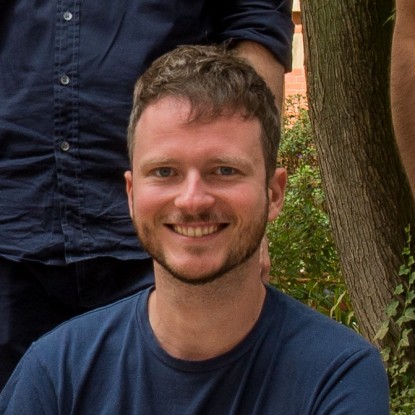Bio
After studying psychology and computer science in Darmstadt and working in the Psychology of Information Processing lab as a resarch assistant, I decided to stay and join the lab as a PhD student in 2019.
After successfully defending his PhD thesis “Inverse normative modeling of continuous perception and action”, he left the lab in April of 2025 and is now working as a postdoc with Máté Lengyel in the Computational and Biological Learning Lab at Cambridge
Research interests
I am interested in probabilistic models of perception and action in naturalistic sequential tasks. To understand the uncertainties, intrinsic costs of behavior, and subjective internal models involved in these tasks, I use computational modeling techniques including inverse optimal control and Bayesian inference.
Presentations and Publications
- Straub, D., Niehues, T. F., Peters, J., & Rothkopf, C. A. (2024). Inverse decision-making using neural amortized Bayesian actors. arXiv preprint arXiv:2409.03710.
- Straub, D., & Rothkopf, C. (2024). If it looks like online control, it is probably model-based control. In Proceedings of the Annual Meeting of the Cognitive Science Society (Vol. 46).
- Thomas, T., Straub, D., Tatai, F., Shene, M., Tosik, T., Kersting, K., & Rothkopf, C. A. (2024). Modelling dataset bias in machine-learned theories of economic decision-making. Nature Human Behaviour, 8(4), 679-691.
- Straub, D., Schultheis, M., Koeppl, H., & Rothkopf, C. A. (2023). Probabilistic inverse optimal control for non-linear partially observable systems disentangles perceptual uncertainty and behavioral costs. Advances in Neural Information Processing Systems, 36.
- Zhao, H., Straub, D., & Rothkopf, C. A. (2023). People learn a two-stage control for faster locomotor interception. Psychological Research, 1-20.
- Tatai, F., Straub, D., & Rothkopf, C. (2023). People use Newtonian physics in intuitive sensorimotor decisions under risk. In Proceedings of the Annual Meeting of the Cognitive Science Society (Vol. 45, No. 45).
- Straub, D., & Rothkopf, C. A. (2022). Putting perception into action with inverse optimal control for continuous psychophysics. Elife, 11, e76635.
- Schultheis, M., Straub, D., & Rothkopf, C. A. (2021). Inverse optimal control adapted to the noise characteristics of the human sensorimotor system. Advances in Neural Information Processing Systems, 34, 9429-9442.
- Zhao, H., Straub, D., & Rothkopf, C. A. (2021). How do people steer a car to intercept a moving target: Interceptions in different environments point to one strategy. Quarterly Journal of Experimental Psychology, 74(10), 1686-1696.
- Straub, D., & Rothkopf, C. A. (2021). Looking for image statistics: active vision with avatars in a naturalistic virtual environment. Frontiers in Psychology, 12, 641471.
- Zhao, H., Straub, D., & Rothkopf, C. A. (2019). The visual control of interceptive steering: How do people steer a car to intercept a moving target?. Journal of vision, 19(14), 11-11.
Teaching
| Summer 2023 | Statstical modeling for cognitive science |
| Winter 2022/23 | Statistical modeling for psychology |
| Summer 2022 | Statstical modeling for cognitive science |
| Summer 2022 | Computer-based data analysis |
| Winter 2021/22 | Statistical modeling for psychology |
| Summer 2021 | Experimental psychology practice |
| Summer 2021 | Statstical modeling for cognitive science |
| Winter 2020/21 | Cognitive science MSc project |
| Summer 2020 | Experimental psychology practice |
| Summer 2020 | Statistical modeling for cognitive science |
Co-supervised theses
M.Sc.
Tobias Niehues – Approximate Bayesian Inference of Parametric Cost Functions in Continuous Decision-Making
Fabian Tatai – Shooting pucks at targets for money: Economic and sensorimotor decision making during physical object interactions
B.Sc.
Lukas Maninger – Predicting human similarity judgments with normalizing flows
Anna-Maria Kugler – An investigation of optimality in sensorimotor actions

